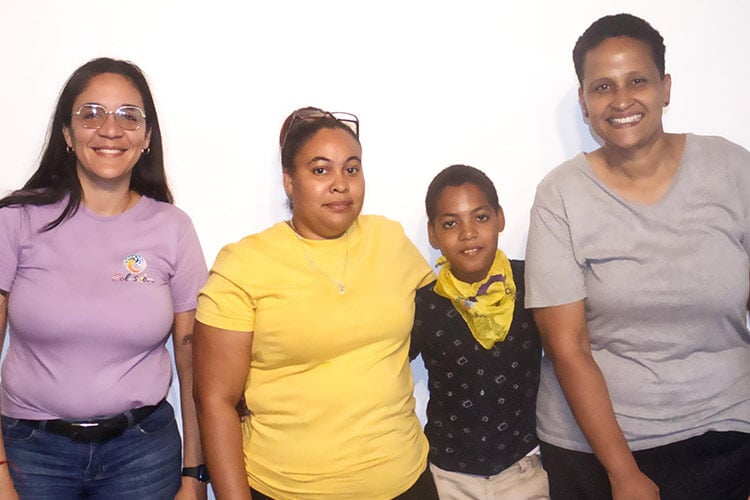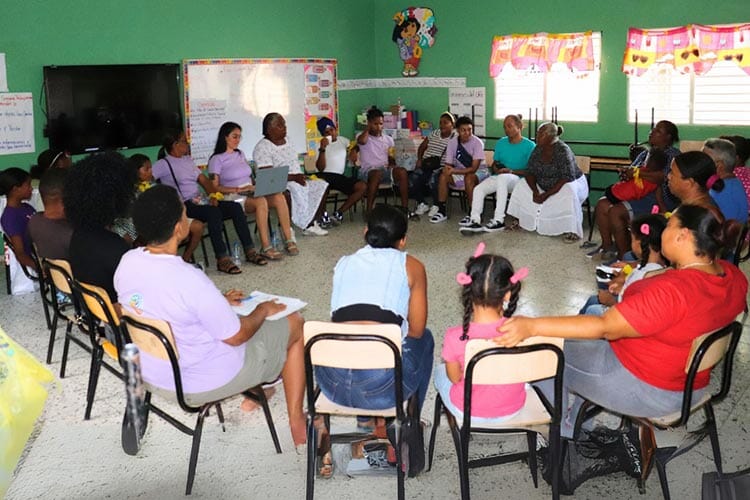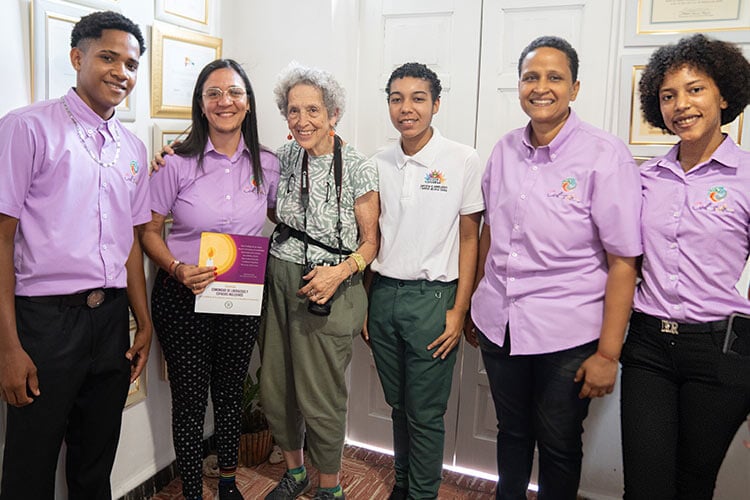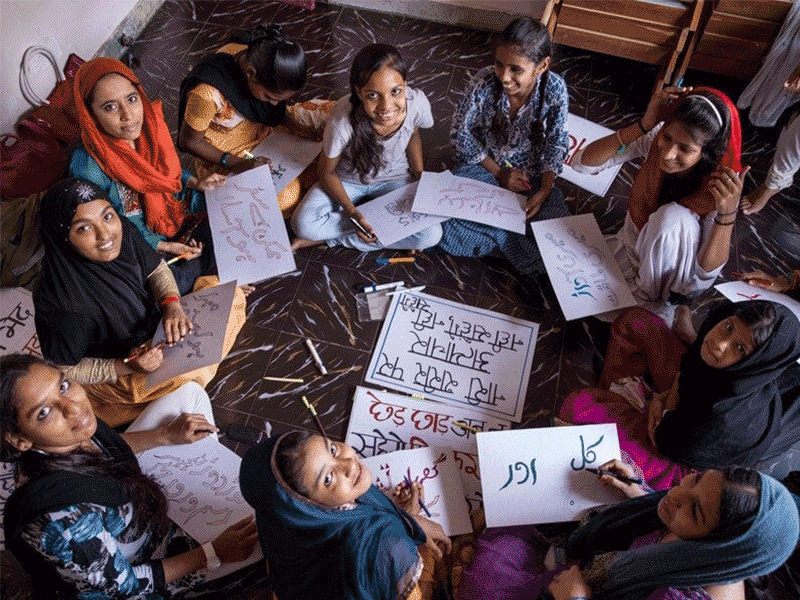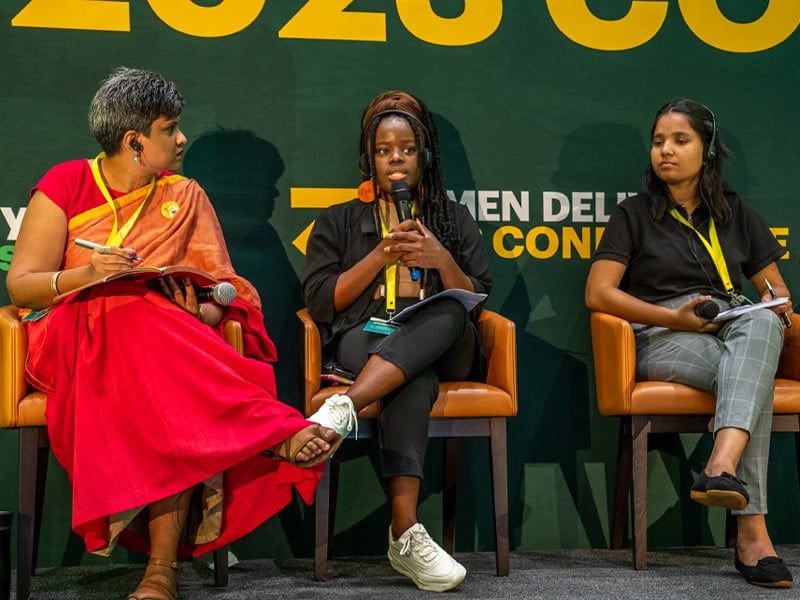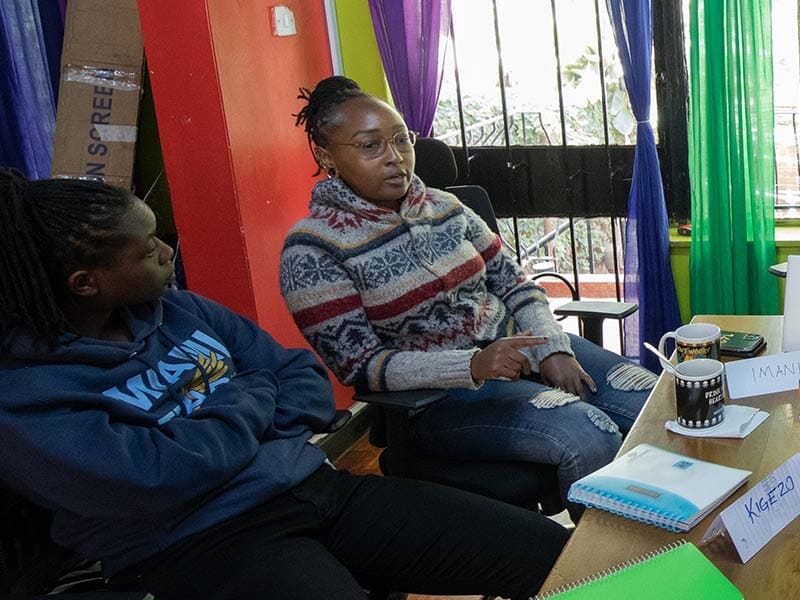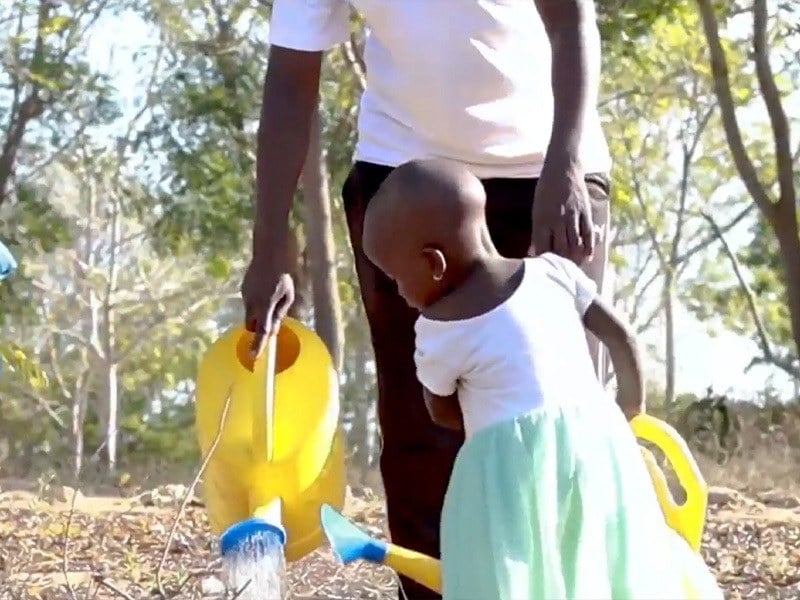The first time someone from Comunidad de Liderazgos y Espacios Inclusivos Dominicana (COLESDOM) knocked on her door, Grabiela was suspicious. The representative explained that COLESDOM was a nonprofit organization that supports LGBTQI+ people and that they were there to help. But she’d heard those promises before — promises that no one had kept.
Grabiela lives in Las Salinas de Barahona in the Dominican Republic. Since the 1970s, the town has been known for the high number of intersex people born there. Over the years, doctors, scientists and journalists have passed through the town, asking questions, conducting clinical tests and promising to help.
Grabiela (wearing a yellow t-shirt) with Josthin (wearing a yellow bandana) and COLESDOM staff. Photo courtesy of COLESDOM.
“They all left and we never heard from them again,” she explained. “But COLESDOM was different.”
Founded in 2017, COLESDOM — an AJWS grantee organization — helps coordinate social services, advocates for public policies to address discrimination against and offers training to empower youth leaders.
In February 2025, their team drove nearly six hours from their office in Santo Domingo to Las Salinas de Barahona to launch an initiative aimed at helping intersex people in this community change their birth certificates to match their gender. Many were declared female at birth but develop diverse sexual characteristics during puberty and, in most cases, identify as male.
In the days leading up to the initial meeting at a local school, COLESDOM staff went door-to-door, introducing themselves and explaining their mission.
“We had to build trust with the community because of their past experiences with outsiders,” said Rosalba Diaz Crisostomo, Founder and Executive Director of COLESDOM. “Going to the homes and talking to each family was a very important first step.”
By all accounts, that first meeting was a success. COLESDOM staff met with family members of intersex people to learn about each particular case and how they could best support them.
School meeting with COLESDOM. Photo courtesy of COLESDOM.
“Some people didn’t really understand what it means to be intersex and all the diversity within that community” Rosalba said. “We want people to be able to accept who they are and enjoy their bodily diversity.”
Two months later, COLESDOM returned for a second visit with the families. Among them were Grabiela and her 12-year-old son, Josthin.
“I didn’t know anything about intersex people,” she said. “When Josthin was born, to me he was a girl. So I treated him like one.”
Everything changed one day after a meeting with a school psychologist.
“The doctor told me my daughter was a boy. He said ‘she has a boy’s face. You should cut his hair and start treating him like a boy,’” she recounted.
She listened and sent him for a haircut.
“I remember when Josthin walked through the door, I saw he had the same face as my other son,” she said. “That’s when I realized that yes, he’s definitely a boy and I started dressing like one.”
But then the bullying began.
“The boys made jokes because they were always used to him being a girl,” Grabiela recounted. “My older daughter would get into fights trying to defend him. For a while, it was hard. Fortunately, things have calmed down.”
Her story is very familiar to Carlos, who spent the first eight years of his life as “Carla.” He was too young to remember who visited his home asking questions about his gender identity, but they recommended that his grandparents cut his hair and change the way he dressed. They also spoke to his school’s principal. His teachers accepted the change, but his classmates didn’t at first.
“The bullying was so bad that my grandparents were about to pull me out of school…we didn’t know what to do. But the teachers talked to all the students. Things got better and I was able to finish high school,” says Carlos, 19, who now works for COLESDOM as a Community Worker.
Carlos plans to go to college, but he wants to do so with legal documents that reflect his true gender and name. COLESDOM helped him pay for karyotype tests and sonograms that confirmed his gender, found doctors sensitive to his needs, and navigated the legal process required to change his name on official documents. And earlier this month, Carlos received his new identity documents.
“That’s why COLESDOM’s support is so important,” says Carlos. “My grandparents don’t have the resources for the medical tests and the legal process. It would have been impossible to do everything that’s been done”
Carlos (left), Rosalba (second from left) and other members of COLESDOM receive a plaque of appreciation from AJWS Global Ambassador Ruth Messinger for their work with the LGBTQI+ community in the Dominican Republic. Photo by Fran Afonso.
The experience has changed him in other ways. The once shy teenager is now a youth leader in his hometown and proud of his intersexuality.
“It’s a big difference to go from being a person who suffered a lot of bullying to being a person who helps others change their situation,” Carlos said. “To me, that means everything.”
Grabiela sees a similar transformation in Josthin, who always said he felt like a boy. Thanks to COLESDOM, she was also able to get karyotype testing and is now going through the legal processes to rectify her son’s birth certificate.
“COLESDOM has changed our lives a lot,” she says. “Josthin is much happier now.”

